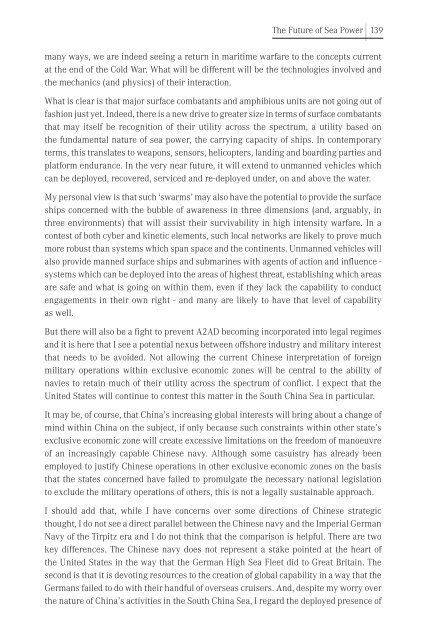THE FUTURE OF SEA POWER
SPC2015_Proceedings
SPC2015_Proceedings
Create successful ePaper yourself
Turn your PDF publications into a flip-book with our unique Google optimized e-Paper software.
The Future of Sea Power |<br />
139<br />
many ways, we are indeed seeing a return in maritime warfare to the concepts current<br />
at the end of the Cold War. What will be different will be the technologies involved and<br />
the mechanics (and physics) of their interaction.<br />
What is clear is that major surface combatants and amphibious units are not going out of<br />
fashion just yet. Indeed, there is a new drive to greater size in terms of surface combatants<br />
that may itself be recognition of their utility across the spectrum, a utility based on<br />
the fundamental nature of sea power, the carrying capacity of ships. In contemporary<br />
terms, this translates to weapons, sensors, helicopters, landing and boarding parties and<br />
platform endurance. In the very near future, it will extend to unmanned vehicles which<br />
can be deployed, recovered, serviced and re-deployed under, on and above the water.<br />
My personal view is that such ‘swarms’ may also have the potential to provide the surface<br />
ships concerned with the bubble of awareness in three dimensions (and, arguably, in<br />
three environments) that will assist their survivability in high intensity warfare. In a<br />
contest of both cyber and kinetic elements, such local networks are likely to prove much<br />
more robust than systems which span space and the continents. Unmanned vehicles will<br />
also provide manned surface ships and submarines with agents of action and influence -<br />
systems which can be deployed into the areas of highest threat, establishing which areas<br />
are safe and what is going on within them, even if they lack the capability to conduct<br />
engagements in their own right - and many are likely to have that level of capability<br />
as well.<br />
But there will also be a fight to prevent A2AD becoming incorporated into legal regimes<br />
and it is here that I see a potential nexus between offshore industry and military interest<br />
that needs to be avoided. Not allowing the current Chinese interpretation of foreign<br />
military operations within exclusive economic zones will be central to the ability of<br />
navies to retain much of their utility across the spectrum of conflict. I expect that the<br />
United States will continue to contest this matter in the South China Sea in particular.<br />
It may be, of course, that China’s increasing global interests will bring about a change of<br />
mind within China on the subject, if only because such constraints within other state’s<br />
exclusive economic zone will create excessive limitations on the freedom of manoeuvre<br />
of an increasingly capable Chinese navy. Although some casuistry has already been<br />
employed to justify Chinese operations in other exclusive economic zones on the basis<br />
that the states concerned have failed to promulgate the necessary national legislation<br />
to exclude the military operations of others, this is not a legally sustainable approach.<br />
I should add that, while I have concerns over some directions of Chinese strategic<br />
thought, I do not see a direct parallel between the Chinese navy and the Imperial German<br />
Navy of the Tirpitz era and I do not think that the comparison is helpful. There are two<br />
key differences. The Chinese navy does not represent a stake pointed at the heart of<br />
the United States in the way that the German High Sea Fleet did to Great Britain. The<br />
second is that it is devoting resources to the creation of global capability in a way that the<br />
Germans failed to do with their handful of overseas cruisers. And, despite my worry over<br />
the nature of China’s activities in the South China Sea, I regard the deployed presence of


